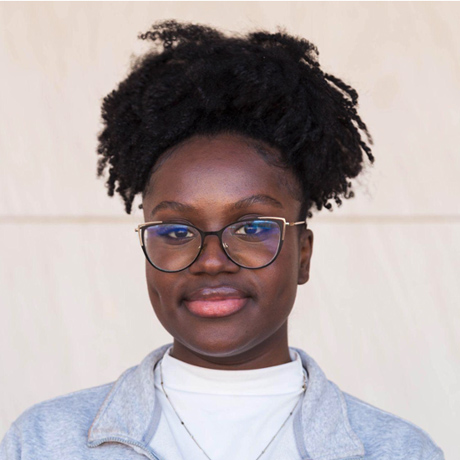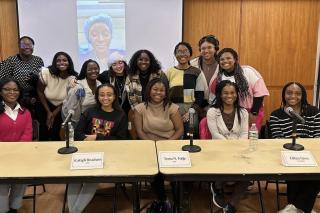Established in 2017, the National Society of Black Women in Medicine is committed to increasing the recruitment and retention of Black women pursuing careers in the medical field. This academic year, Neurobiology major Debora Edouard ’24 and Biochemistry and Public Health minor Kadijah McClean ’24 co-founded the Simmons chapter of the Society.
Near the end of the 2023 academic year, Kadijah McClean ’24, a double major in Biochemistry and Public Health, was sitting with a group of STEM classmates in Lefavour Hall. “I told them that I wanted to start an organization for healthcare-related majors, specifically for BIPOC students.... My peers said that was a great idea, and that they would definitely join this kind of club.”
As Neurobiology major Debora Edouard ’24 explains, “Although I have found wonderful STEM mentors at Simmons, I sensed that the newer Black students did not know how to approach professors and access key resources.”

Both Edouard and McClean feel compelled to work in the medical field. Edouard is following a pre-medicine track and hopes to obtain an MD-PhD, whereas McClean desires to become an OBGYN. During her Simmons career, McClean volunteered for the American Red Cross, which led to an interest in the social justice aspect of medicine, hence her minor in Public Health.
“Women and communities of color are not always afforded the resources or opportunities to excel in the medical profession, so we want to nourish them, especially at a predominantly white institution like Simmons,” says Edouard. “Kadijah and I decided that we needed to bring a chapter of the National Society of Black Women in Medicine to Simmons.”
The Society’s vision is “committed to supporting current and future healthcare professionals and scientists in efforts to combat educational and professional racial inequities by promoting attainability through educational resources, unity, and mentorship.” As Edouard says, “The Society aims to support and retain Black people who are already in medicine as well as support those who are interested in that pathway.”
In February of 2024, the Simmons chapter became official, with Edouard serving as President and McClean serving as Vice President. McClean adds that “our Society chapter also replicates the inclusive gender model that Simmons has adopted.” Simmons is women’s-centered, which includes transgender and non-binary individuals.
For Simmons students who wish to join the Society, they can choose from two levels of membership. To be a general member, students must attend at least two Society events per year and maintain a 2.0 GPA. To be a Collegiate Member, students must attend most Society events and pay the membership fee (approximately $30 per semester). Being a Collegiate Member offers additional perks, including professional headshots and mentorship from Harvard medical students. The Simmons chapter has a robust online presence on Instagram through which students can find out about their events and other pertinent information.
Curating Inclusive Events
Together with the rest of their Executive Board, Edouard and McClean have planned varied programming, which includes panels, film screenings, CPR workshops, blood drives, and much more. They also allow non-Simmons students from the Colleges of the Fenway to attend these events.
Although the Simmons chapter did not become official until February, Edouard and McClean began curating events months earlier. Last October, they hosted a game night to break the ice and socialize with potential members. In November they held a discussion panel. “We had seven Black women health professionals there, including two medical students, a dental student, two residents, a pharmacist, and a scientist,” says Edouard. “We had a fantastic turnout of over 60 people. All the tables were filled and we had a great discussion.”
Once the Simmons chapter became official, Edouard and McClean hosted a film screening of the award-winning documentary At Your Cervix on February 22. Directed by Amy Jo Goddard, this film brings attention and awareness to the prevalence of non-consensual pelvic exams (typically conducted by medical students when patients are anesthetized). “Shockingly, the state of Massachusetts does not have a law against this, so we thought it was critical to galvanize awareness and advocacy surrounding this issue,” says Edouard. “With the help of Professor of Chemistry and Physics Jennifer Roecklein-Canfield, we brought the filmmaker to campus, as well as prominent feminist activists, and a medical doctor for a post-film discussion.”
In partnership with Simmons’ Student Government Association (SGA), the Society hosted a blood drive on March 15. “We aim to enhance diversity within the donor pool by actively promoting increased participation from Black donors, especially for the sickle cell initiative.” explains Kadijah.
Some Society events are less academic in nature, but nevertheless crucial for building a Black sisterhood. “We held a Healing Circle on March 25, which was really about discussing traumas that have occurred within the medical field, and particularly those that have affected the Black community,” says McClean. “We wanted to offer a safe space for our members to express their emotions and frustrations.”
Edouard and McClean are especially looking forward to the Society chapter induction ceremony, which will be held at Simmons on April 27. “Students who are Collegiate Members will be inducted into the national chapter. They will also receive a white coat and a certificate, which symbolize their commitment to healthcare, community service, and DEI. Moreover, inductees will receive access to a spreadsheet with current available scholarships, Medical, Dental, and PA school stats, and job boards in research or medicine-related fields,” says Edouard.
Building Community at Simmons

McClean was drawn to Simmons for its women’s-centered environment and diverse community. “I assumed roles as the Diversity, Equity and Inclusion Officer and Vice President within the Student Government Association (SGA), collaborating with other student-led organizations on DEI initiatives. This, to me, embodies the essence of community.” Moreover, both she and Edouard are thankful that STEM faculty have been supportive of their efforts to establish a Society chapter on campus. “No matter what we dream up in our minds, faculty like Professor Jennifer Roecklein-Canfield and Professor Rich Gurney are always willing to push us to realize these aspirations,” says McClean.
Over the last few months, the Society co-directors observed that their members have matured personally and professionally. “I noticed that these women, including myself, are more self-confident. This organization benefits not just younger students but also seniors who are going out into the medical profession, looking for jobs and graduate programs,” says McClean.
“For me, co-directing the Society chapter with Debora and our Executive Board has fostered a desire to learn more about the different opportunities in medicine,” says McClean. “This particular organization can connect what we learn in the classroom to personal experiences, namely those that disproportionately impact people of color.” The co-directors find the collaborative aspect of their work immensely gratifying. “I love working with Debora, and she always challenges me to think about things in a different way,” says McClean. “Debora tends to think of things from a logistical perspective, but I think in terms of themes and trends in medicine. Our entire team is so creative, and together we have come up with a great lineup of events. I feel that this experience has allowed us to grow closer authentically and meaningfully.”
Diversifying STEM = Paying it Forward
As first-generation students, Edouard and McClean realize the importance of having role models that you can emulate. “STEM-related fields are typically comprised of a lot of old, white men,” says Edouard. “We want to see more people who look like us. Without diverse representation, our confidence diminishes, and we may experience imposter syndrome.”
As Edouard continues, “We are planning events that we would have loved to see when we began college. We always think, ‘Wow, we should have started this earlier!’ But we are still glad that we have this now.” “For me, co-directing the Society chapter is being a part of something that is bigger than I am,” says McClean. “Joining this organization has prompted me to contemplate how STEM has evolved. We are so indebted to historical women like Henrietta Lacks (1920–1951) [an African American woman who unknowingly contributed to cancer research]; and Lucy, Anarcha, and Bets(e)y [three enslaved women who were forced to undergo experimental surgeries at the hands of Dr. James Marion Sims]. These women faced insurmountable obstacles and were subjected to harsh environments. I want to make STEM more inclusive and be a mentor for younger Black women. Achieving my own goals is just as important as helping others along the way.”

